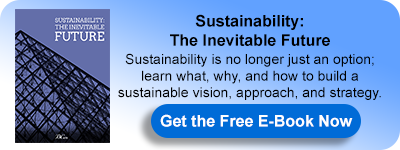Sustainability, Innovation, and Business are not Mutually Exclusive
Why should a business operating out of self-interest be concerned with sustainability?
This is the question that today's economists, businessmen and sociologists are asking. While it seems counter-intuitive for a corporation to be concerned with anything beyond profitability, most of today's businesses are interested in sustainability. The obvious explanation for sustainable operations is a business's concern for its brand, reputation and trustworthiness. Also, stakeholders and government regulations are forcing private entities to operate in a sustainable manner.
A 2013 survey centered on the top three “current driving factors to take action on sustainability issues”, was doled out to 1,000 CEOs across the globe. The survey's results show that 27% of CEOs believe that “Government/regulatory environment” is a driving factor behind the corporate push for sustainability. Exactly 12% of the respondents replied that “Pressure from investors/shareholders” was a motivation. These responses make it clear that these corporations aren't incorporating sustainable practices out of altruism. Rather, they are acting in a reactive manner in response to a multitude of external pressures.
However, on the other hand, the survey respondents' most popular answers were, “Potential for revenue growth/cost reduction” (49%) and “Consumer/customer demand” (47%). From the corporate standpoint, sustainability really is an opportunity to gain market share. It allows them to increase their competitive advantage and attract more customers.
Transforming Sustainability Into an Opportunity
Internally, corporate leadership panels across the globe are questioning how to to flip the sustainability issue on its head. They want to manipulate it in a manner that turns it into an asset instead of a potential liability. In short, the corporate aim for the sustainability issue is to transform it into a new business opportunity.
Newlight, founded in 2003, is an example of a corporation that has succeeded in differentiating itself from other companies through the manner in which it tackles sustainability issues. Its existence was centered around a single question: Why can't we use greenhouse gas emissions as a resource to create materials?
The efforts in the greenhouse gas measures space primarily consist of reducing emission levels as much as possible. Once reduced, the concern becomes offsetting any unavoidable gas emissions. This is often accomplished through investment in activities that reduce emissions. Newlight's idea of collecting emitted greenhouse gases and reusing them as resources is a very innovative concept.
After 10 years of research, Newlight has invented a carbon capture technology that combines air with greenhouse gas emissions to produce a plastic, carbon-negative material called AirCarbon™. AirCarbon™ plastics are currently used by over thirty companies. One such company is the popular cellular phone provider, Sprint. They sell a smartphone case made from Air Carbon™. Mr. David Owens, Sprint’s Senior Vice President of Products, states, “We are pleased to introduce this new technology – essentially turning greenhouse gas into a plastic that has the potential to replace petroleum-based plastics. This innovation is another example of Sprint’s leadership in providing eco-friendly products to our customers.”
Corporations Should be Revered for Their Sustainability Practices
It is clear that the corporate sector has a multifaceted motivation to pursue sustainable products and operations. They've developed innovative ideas, goods, services and processes that have created new values and means to solve important problems. These companies should be recognized as trailblazers in their respective fields.
From now on, the companies who bring about innovation through product development, new technologies, and alternative manufacturing and sales processes will be considered to be the leaders of the corporate sustainability movement. Those that proceed through each stage of business from production all the way to the delivery to the general consumer should be revered for their commitment to preserving our environment and their concern for posterity.
References:
- UN-Accenture, 2013, UNGC CEO Study (Respondents identifying their top three choice) http://www.accenture.com/SiteCollectionDocuments/PDF/Accenture-UN-Global-Compact-Acn-CEO-Study-Sustainability-2013.PDF ·
- UNEP, 2012, The Business Case for the Green Economy http://www.unep.org/greeneconomy/Portals/88/documents/partnerships/UNEP%20BCGE%20A4.pdf ·
- Bruce Watson, 2014, The Guardian; Could future clothes, bottles and chairs be made from carbon emissions?http://www.theguardian.com/sustainable-business/aircarbon-sustainable-materials-greenhouse-gases-carbon-dioxide ·
- Sprint.com, 2014, Better Solutions, One Phone Case at a Time: Sprint Supports New Technology That Turns Greenhouse Gas into Plastic. http://newsroom.sprint.com/news-releases/better-solutions-one-phone-case-at-a-time-sprint-supports-new-technology-that-turns-greenhouse-gas-into-plastic.htm
For more about the topic of sustainability, download our latest book " Sustainability: The Inevitable Future " for FREE:
